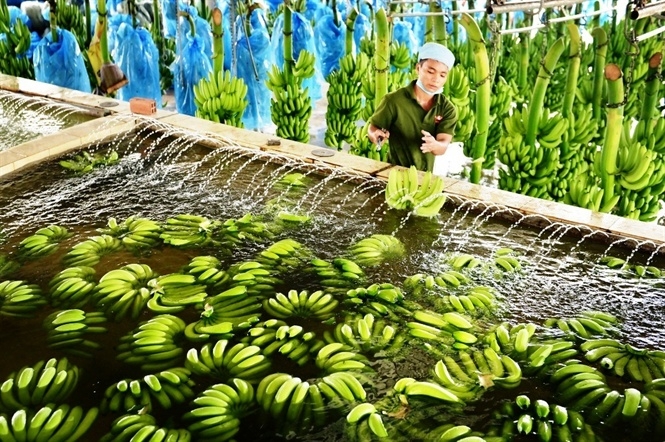Source: Haiquanonline.com

In the first 5 months of 2022, while the export of most vegetables and fruits to China decreased, banana exports increased sharply. Source: Internett
Export value down 17%
Speaking at the Forum “Strengthening solutions for sustainable development of production and consumption of key fruit products in the South” organized by the Ministry of Agriculture and Rural Development on June 8, Mr. Dang Phuc Nguyen, General Secretary of the Vegetable Association According to a report from Vietnam, in the first 5 months of 2022, the export turnover of vegetables and fruits reached 1.4 billion USD, down 17% compared to the same period last year. The reason is because the market share of Vietnamese fruit and vegetables in the Chinese market has decreased deeply.
Notably, in the past time, exports to China have all shown signs of decline, but bananas alone recorded a remarkable growth. In the 5 months of 2022, China imported 742 thousand tons of bananas, up 10% over the same period last year; in which, Vietnamese bananas account for 43% market share, surpassing the Philippines with 28% market share.
Mr. Dang Phuc Nguyen said that in the coming time, China will increase the import of Vietnamese bananas. The reason is because Vietnam is geographically closer to China than other countries. Besides, China’s banana acreage has decreased due to increased input costs, land rental costs and labor costs.
Regarding the context of fruit and vegetable exports to China in the second half of the year, the General Secretary of the Vietnam Fruit and Vegetable Association said that China is likely to remove the “Zero Covid” policy from the end of 2022 to the beginning of 2023. However, exporting vegetables and fruits in particular and agricultural products in general to the Chinese market is still difficult at the moment.
Affirming that China is an important market for Vietnamese fruits and vegetables, Mr. Dang Phuc Nguyen emphasized: “In the future, if China no longer maintains the “Zero Covid” policy, Vietnam will be able to compete very well. good even with countries in the region. In order to increase market share in this market, Vietnamese products need to improve their quality.”
From the perspective of an export business, Ms. Ngo Tuong Vy, Deputy Director of Chanh Thu Fruit Import-Export Co., Ltd assessed: the Chinese market has changed a lot. If localities do not spread to farmers, changing habits and outdated farming practices will be difficult for the consumption of agricultural products.
“Therefore, all units participating in the linkage chain from state management agencies, businesses and farmers must actively change and actively participate,” said Ms. Tuong Vy.
Sharing at the forum, Mr. Luong Phuoc Vinh, Southeast Asia director of Tentamus Group, said that vegetables and fruits in particular and Vietnamese agricultural products in general are currently too dependent on the Chinese market, lacking information. for market orientation.
In the context that production in Vietnam’s raw material areas has been implemented quite well, according to Mr. Luong Phuoc Vinh, many European markets are very potential for Vietnamese agricultural products, not inferior to the Chinese market if Vietnamese products can meet the requirements and standards set forth. “It is important for Vietnam to understand the nature and requirements of the market. European partners will be ready to support,” said a representative of Tentamus Group.
Comply with and protect the national agricultural product brand
Paying a lot of attention to the issue of finding raw vegetables and fruit areas that are granted planting area codes for purchasing, processing and exporting, Mr. Nguyen Dinh Tung, General Director of Vina T&T Group Import-Export Company stated: This is very difficult, easy to duplicate, entangled with other units and businesses.
In addition, it will be difficult for businesses to continuously apply for a re-certification of the growing area code each year. This makes exporting and handing over orders to international partners delayed.
Regarding the issue of participating in international fairs to widely promote goods, Mr. Tung said that it is advisable to build a “common house” for Vietnamese fruits when participating in international fairs instead of dividing them into small pieces. into booths for businesses like today.
In addition, the selected businesses must show professionalism, refine their image to honor, elevate and affirm the brand of Vietnamese fruit with international friends.
According to Ms. Ngo Tuong Vy, through international fairs, the point that Vietnamese businesses should learn from friends from other countries is compliance and protection of the national agricultural product brand. When businesses participate in the same industry or field, it is necessary to change their thinking in the direction of protecting the common, putting the common first, especially the key products.
Ms. Vy gave an example: for durian, Vietnamese products can completely compete with other countries. However, in order to do this, in addition to confidence, one should also learn the best practices in countries that do well like Thailand in gradually raising the brand name of this product.
“Specifically, building teams, groups, going to each garden to check the quality; calculate the indexes to produce products with the highest quality and uniformity. Besides, it is necessary to help cooperatives and producers to change their thinking towards focusing on safe and quality production”, emphasized Ms. Ngo Tuong Vy.
